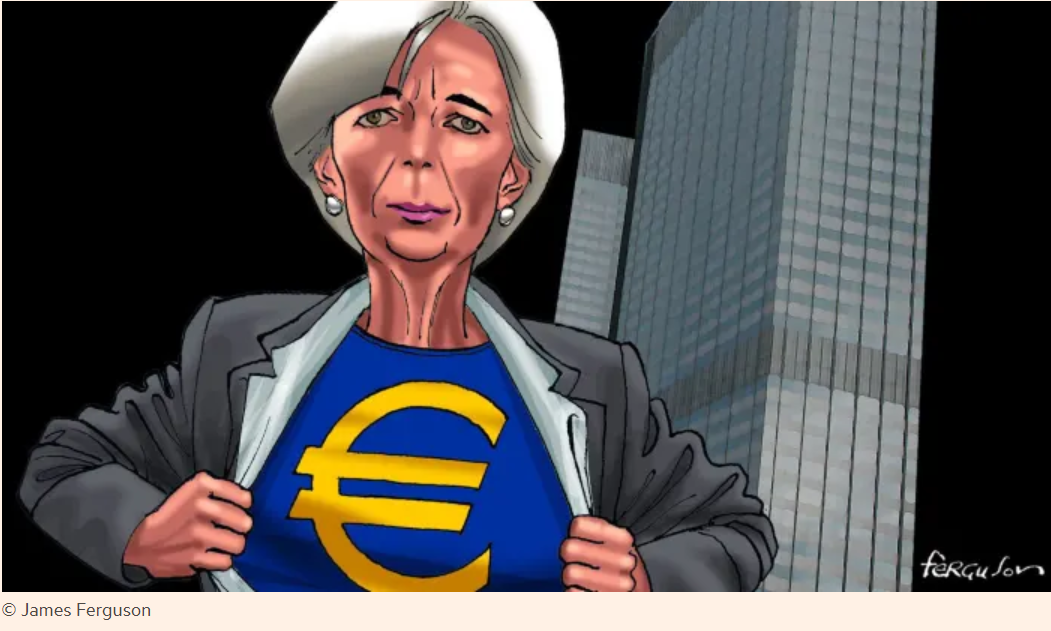Commerzbank mener, at en digital euro udgør en stor risiko for det finansielle system, især for bankerne. Ifølge ECBs forslag til en digital valuta skal virksomheder og private kunne placere deres midler som en digital valuta i ECB. Det kan i værste fald føre til, at en fjerdedel af bankernes funding bliver overført til ECB. Bankerne kan kun kompensere for dette indlånsfald ved at sætte indlånsrenterne i vejret, men samtidig må de hæve udlånsrenterne. Hvordan man end vejer og drejer det, vil det føre til en lavere markedsdisciplin, mener Commerzbank. Digitale valutaer overvejes i alle centralbanker. Kina bliver formentlig det land, der først indfører en digital valuta. En digital valuta skal ikke forveksles med bitcoin og andre crypto-valutaer.
The hidden risks of the digital euro
The ECB is considering the introduction of digital central bank money.
The digital euro is risky. The ECB could e.g. impose a penalty interest rate on digital central bank
money, unlike cash, and thus impose even lower negative interest rates on the financial markets.
Digital bank runs could also occur, destabilizing the banking system. Moreover, many consider data
protection to be at risk because movements of the digital euro can be recorded differently from those
of cash.
However, few see the risk that digital central bank money will increase the power of the
central bank and lower market discipline on states, companies and banks.
What is digital central bank money?
So far, only banks can hold accounts with the ECB and make electronic (digital) transfers with this
central bank money. Private individuals and companies are not allowed to do this; they can only hold
balances in accounts at commercial banks. Private individuals have access to the money issued by
the ECB, the central bank money, only in the form of cash. They can only hand over central bank
money physically, but not digitally by bank transfer.
The ECB wants to change that with a digital euro; private individuals, like banks, are to be given the right to maintain accounts with it.
Transfers from cash to digital euros would not be problematic, …
If the digital euro offers citizens an additional way of holding money, they will shift their money.
Exchanging cash for digital euros would not be problematic. In the central bank’s balance sheet,
only one form of central bank money (cash) would be replaced by another (digital euros); the size
of the central bank balance sheet would remain unchanged. The balance sheets of the commercial
banks would not be affected at all.
… but those of bank deposits
By contrast, an important source of funding would be lost for banks if citizens exchanged bank
deposits for digital euros, i.e. transferred money from their accounts at commercial banks to their
accounts at the ECB. In such a case, a commercial bank must transfer the entire amount from its
ECB account to the citizen’s ECB account. Accordingly, the commercial bank’s balance on its ECB
account decreases; its balance sheet shrinks.
Banks lose important source of funding, …
The scale of these shifts is potentially very large. For example, individuals and businesses in the
euro area hold €7,299 billion in their commercial banks’ current accounts. If, at the extreme, they
transferred all of that to ECB accounts, banks would lose almost a quarter of their funding.
Of course, banks would try to prevent such an outflow of funds. For example, they could make their
sight deposits more attractive by offering interest rates. They could also attract longer-term savings
or time deposits to replace sight deposits, or issue more bonds. However, all of these options would
make banks’ borrowing more expensive.
… which the ECB can replace in three ways, …
To compensate for this and avoid an erosion of their earnings, banks would have to raise their lending
rates. But then companies and private households would demand less loans. If the ECB wants to
prevent a decline in lending volumes, it will have to close the banks’ funding gap itself. To do so, it
would have three main options, all of which would come with serious side effects:
• First, the ECB could buy government bonds from banks and credit the equivalent value to their
ECB accounts.
• Second, the ECB could close the banks’ funding gap by buying corporate bonds from them.
• Third, the ECB could refrain from buying government or corporate bonds and instead close the
banks’ funding gap by lending more to them.
… with market discipline diminishing.
You can spin it any way you want. If the ECB replaces the banks’ funding, which is eliminated by
the digital euro, it reduces market discipline on states, companies or banks – with all the negative
consequences for prosperity and freedom.









